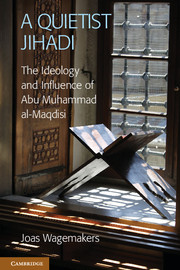Book contents
- Frontmatter
- Contents
- Preface
- Acknowledgements
- Glossary
- Note on Transliteration
- Introduction
- Part I Al-Maqdisi's Life and His Place in the Jihadi Ideological Spectrum, 1959–2009
- Part II Al-Maqdisi's Influence on the Saudi Islamic Opposition, 1989–2005
- Part III Al-Maqdisi's Influence on the Development of al-Walāʾ wa-l-Barāʾ, 1984–2009
- 6 The Revival of al-Istiʿāna bi-l-Kuffār
- 7 ‘Salafising’ Jihad
- Part IV Al-Maqdisi's Influence on the Jordanian Jihadi-Salafi Community, 1992–2009
- Bibliography
- Index
- References
6 - The Revival of al-Istiʿāna bi-l-Kuffār
Published online by Cambridge University Press: 05 July 2012
- Frontmatter
- Contents
- Preface
- Acknowledgements
- Glossary
- Note on Transliteration
- Introduction
- Part I Al-Maqdisi's Life and His Place in the Jihadi Ideological Spectrum, 1959–2009
- Part II Al-Maqdisi's Influence on the Saudi Islamic Opposition, 1989–2005
- Part III Al-Maqdisi's Influence on the Development of al-Walāʾ wa-l-Barāʾ, 1984–2009
- 6 The Revival of al-Istiʿāna bi-l-Kuffār
- 7 ‘Salafising’ Jihad
- Part IV Al-Maqdisi's Influence on the Jordanian Jihadi-Salafi Community, 1992–2009
- Bibliography
- Index
- References
Summary
In the previous chapters, we have regularly come across the term al-walāʾ wa-l-barāʾ as a distinctly Salafi and – particularly – Wahhabi concept, without actually dealing with it in any greater detail. This chapter and the next are meant to do just that. In what follows, I will focus on the notion of al-istiʿāna bi-l-kuffār, a dimension of al-walāʾ wa-l-barāʾ that is rooted in Islamic tradition, particularly in its Wahhabi version. The inadmissibility of asking ‘infidels’ for help as reasoned by Wahhabi scholars, particularly against other Muslims during a time of war, was rediscovered by Abu Muhammad al-Maqdisi, and it is likely that through his work a revival of the concept was set in motion.
This chapter starts by giving a historical overview of the concept of al-walāʾ wa-l-barāʾ from its pre-Islamic beginnings to its reinterpretation in nineteenth-century Wahhabi discourse, with special attention to the dimension of al-istiʿāna bi-l-kuffār. It then deals with al-Maqdisi's rediscovery of the Wahhabi version of this notion and how this was picked up and developed further by Saudi-Wahhabi scholars and activists. Finally, the chapter seeks to explain through the use of framing why al-Maqdisi's rediscovery of al-istiʿāna bi-l-kuffār was probably used and built upon by several Saudi Wahhabis. As will become clear, the fact that al-Maqdisi, just as we saw in Chapter 5, made his case by relying on scholars of the Wahhabi-Salafi tradition, who – as we will see – had used al-walāʾ wa-l-barāʾ mostly for quietist purposes, once again underlines his credentials as a quietist Jihadi-Salafi.
- Type
- Chapter
- Information
- A Quietist JihadiThe Ideology and Influence of Abu Muhammad al-Maqdisi, pp. 147 - 164Publisher: Cambridge University PressPrint publication year: 2012



